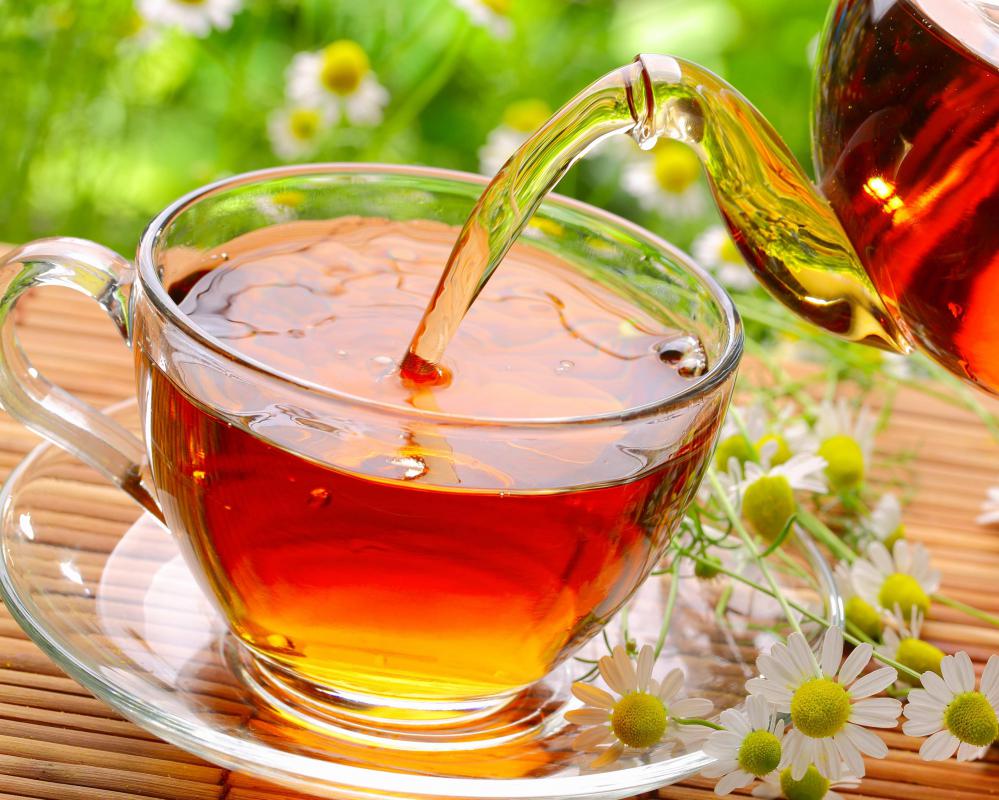At TheHealthBoard, we're committed to delivering accurate, trustworthy information. Our expert-authored content is rigorously fact-checked and sourced from credible authorities. Discover how we uphold the highest standards in providing you with reliable knowledge.
What Is an Herbal Muscle Relaxant?
An herbal muscle relaxant is an herb that causes the muscles of the body to relax, often easing pain associated from muscle spasms or tightness. Some of the most popular herbs used to relax muscles include chamomile, licorice, and kava root. Devil's claw, valerian root, and cayenne pepper may also be used for this purpose. Any herbal muscle relaxant has the potential for causing negative side effects and medication interactions and should be approved by a doctor. It is also important that such muscle relaxants are not used as a substitute for proper medical care.
Chamomile is a popular herbal muscle relaxant and is often used to treat muscle spasms. Muscle tension tends to worsen in times of stress or anxiety, and this herb helps to calm the nerves, adding to the natural muscle-relaxing properties of chamomile. Side effects are rare, although allergic reactions may sometimes occur, especially among those who suffer from seasonal allergies such as hay fever.

Licorice is thought to be an excellent herbal muscle relaxant. This supplement reduces muscle inflammation and is reputed to relieve pain in much the same way as more traditional steroid medications. Possible side effects of licorice include high blood pressure, weight gain, and hormone fluctuations.
Kava root and devil's claw are frequently used as natural muscle relaxants. Both of these herbs are believed to provide relief from pain, and devil's claw may also reduce inflammation. Side effects of kava root may include headaches, dizziness, and skin discoloration. Devil's claw is thought to be safe when used in moderate doses, although taking too much of this supplement may lead to symptoms such as abdominal pain, diarrhea, and loss of appetite.

Valerian root and cayenne pepper may be used to help relax muscles. Often considered to be the best herbal muscle relaxant, valerian root reduces inflammation, eases pain, and promotes restful sleep. Vivid dreams and daytime drowsiness may occur when taking valerian root supplements. Cayenne pepper can be added to recipes or used in muscle rubs for topical pain relief. This remedy can cause a burning sensation when applied topically or taken internally and may cause damage to the skin, esophagus, or stomach.

A doctor should be consulted before taking an herbal muscle relaxant to find out the reason for the muscle tension and pain. Some herbs may not be appropriate for those with certain medical conditions and may impact the effectiveness of some medications. These herbal supplements may be safe for most people, but they should not be used as a substitute for traditional medical treatment.
AS FEATURED ON:
AS FEATURED ON:
















Discussion Comments
I've been hearing great things about Valerian root as a muscle relaxant. I want to use it for hernia pain and inflammation. Does anyone here use it?
Do you drink it or take an extract? How much should I take? Does it contradict with medications or other supplements? Does it have side effects?
Another herbal muscle relaxant is lemonbalm (also called melissa herb). It's actually a sedative. It's great for muscle tension, anxiety and insomnia. It makes me relaxed and sleepy so I usually have it before I go to bed.
@clintflint-- I agree with you but I think that most herbal preparations in tea form and that are sold at stores are safe. I generally never drink beyond one cup of herbal tea to avoid side effects and I've never had any problems.
I would not take licorice or kava root extract exactly for this reason, because I don't know how potent the supplement is. But in tea form, they're usually not very potent and it's easier to dilute.
There are some herbal relaxants like chamomile that are very, very safe though. I know that I can have 2-3 cups of chamomile tea a day, it doesn't have side effects.
I wonder if those people who drink cayenne pepper cleansing drinks end up experiencing the muscle relaxant properties? That might be why that cleanse has a reputation for making you feel good after the first couple of days (before you get really cranky from not having enough to eat).
@clintflint - Honestly, I don't really trust the commercial preparations either. The FDA doesn't have to approve them because of a loophole where they aren't really food and aren't really medications either.
But in some cases, I wouldn't worry too much. Chamomile tea, when drunk in moderation, is perfectly safe and has been used for generations. It's no more dangerous than regular tea (and possibly even safer). I drink it when I want to go to sleep quickly or when I have period pains, since it eases them. It's not the strongest thing in the world, but it's better than nothing.
Licorice in particular can be very dangerous if you take too much of it, or take it too regularly. It's been linked to hypertension and can also be toxic to the liver.
It's only if you have way too much of it that it causes these problems, of course, but often people who self medicate with herbs don't know what the proper dosage should be and can hurt themselves by having too much. There are commercial preparations available with proper dosage information if you don't want to go to a proper doctor.
Post your comments